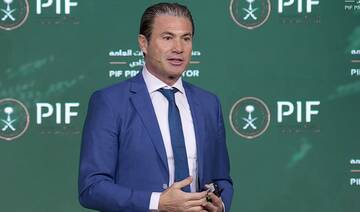HONG KONG: The founder of China’s ByteDance, owner of the wildly successful TikTok app, has for years aspired to make ByteDance the first Chinese firm to rival US internet giants on the global stage. On Thursday Zhang Yiming made a key move to achieve that.
Creating new leadership positions for ByteDance’s China business, Zhang said in a letter to employees he would now focus on global expansion and fresh initiatives such as education.
In a recent, exclusive interview with Reuters, Zhang spoke expansively of his vision of ByteDance as a fully global company in the image of Google and Facebook, even as it faces a national security review by the US government over TikTok’s data practices. Some US government agencies have banned employees from using TikTok over data security concerns.
“There are a lot of misunderstandings out there,” Zhang said from a hotel room in New York, where he spoke to Reuters via video call using ByteDance’s work productivity app Lark.
“We are more localized in different markets than people think.”
TikTok has taken the social media world by storm, especially in the US, vaulting ByteDance to a valuation that sources have told Reuters is close to $100 billion in the secondary market.
That was not just down to luck, say those who know him.
As early as 2013, when the company was just a year old and barely made any revenue, Zhang started planning its global expansion, according to Joan Wang, an early investor in ByteDance and managing director of SIG China.
Zhang told Wang over numerous meetings and phone calls he believed his AI-based recommendation algorithms used in its Chinese-language news aggregator Jinri Toutiao, could be expanded to different languages and content formats.
“The resources at the time seemed far from enough for achieving his global goals,” Wang said.
Chasing global success
TikTok is in talks with the Committee on Foreign Investment in the US (CFIUS) about measures to allow it to avoid divesting the Musical.ly assets it acquired and were later integrated into TikTok, sources have said.
The CFIUS review came amid rising US-China tensions and US concerns about how user data would be handled.
ByteDance has also been working to separate TikTok from many of its Chinese businesses, seeking to provide CFIUS with assurances, Reuters has reported.
“I am not directly involved in this situation,” Zhang said, when asked about how talks with CFIUS were going.
He said overall he was “optimistic” about the company’s interactions with the US government.
Zhang declined to comment on whether CFIUS was satisfied with TikTok’s current handling of data.
Earlier this week, the company announced it had set up a “transparency center” in Los Angeles to show regulators and the public how it manages data and content on the platform.
One major ByteDance investor said some backers had suggested a spin-off of TikTok last year, but the company didn’t consider that option.
Sources familiar with the company also told said that Zhang retains voting control of the firm, which has raised billions of dollars from prominent investors including SoftBank Group Corp, KKR & Co. Inc. and Sequoia Capital China.
ByteDance declined to comment.
His intensified pursuit of global success comes amid rising censorship risks in China after the government in 2018 shut down one of ByteDance’s top products, a joke app, for “lowbrow and vulgar” content.
Zhang said he spent two-thirds of his time outside China last year and likes to indulge in London’s West End musicals and museums. He plans to spend even more time abroad this year as part of an effort to “understand more context.”
IPO plans unclear
Zhang has consciously borrowed strategies from US internet giants including Alphabet Inc.’s Google — ByteDance’s offices in Beijing are decorated with posters including a cover of former Google CEO Eric Schmidt’s book, “How Google Works.”
He delivers town hall speeches every two months to talk about his bi-monthly goals, a conscious nod to Google’s open work culture.
He also eschews Chinese convention and tells employees not to call him “boss” or “CEO.”
And Zhang insists the company’s product development is already global. A new Indian social media app called Helo is an example of a product ByteDance has designed from the ground up for a local market.
“We believe the short-term digital advertising market in India is small, but the growth potential is large,” he said.
Lark, the workplace productivity app, was also optimized for a global roll-out. Zhang discarded an initial plan to start with a focus on China and insisted it be targeted at the US, Europe and Japan from the beginning, a company source said.
But there are some signs that political pressure in the US is altering plans: Lark is shifting its focus from making a big push in the US to markets including Japan and Europe, sources said. A ByteDance spokesman said Japan, Singapore and India are its primary markets.
The Chinese version of Lark, called Feishu, has recently gained much momentum as the coronavirus outbreak has created a surge in demand for work-from-home tools.
ByteDance in 2018 began early-stage preparations for an overseas float to offset political uncertainties at home.
Late last year the company held discussions with Chinese securities regulators about a possible domestic listing, sources said, although it still prefers New York or Hong Kong.
“Currently the IPO is not pressing and we don’t have any imminent plans,” Zhang said.
“But internally we are making preparations as if we’re working on an IPO.”
















